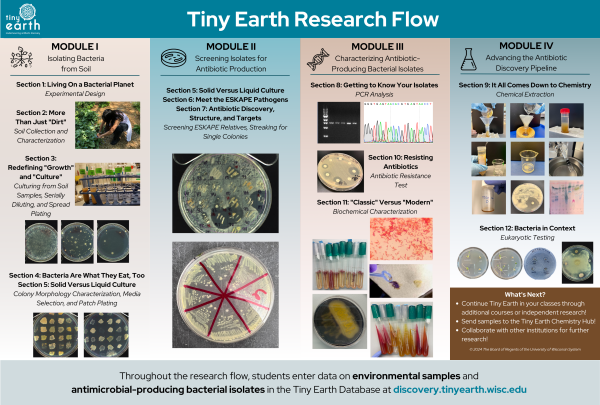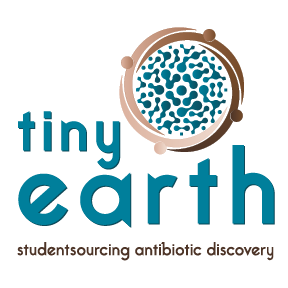Tiny Earth Partner Instructors (TEPIs)
Tiny Earth Partner Instructors (TEPIs) are at the core of the global network. The 800+ instructors who teach the course worldwide are connected by three shared experiences:
Attending an intensive, week-long Tiny Earth Training
Teaching the Tiny Earth course at their institution
Engaging regularly in Tiny Earth network offerings such as teaching workshops, instructor committees, and student research symposia.
Become a TEPI
Apply for TEPI Training
Upcoming Training Dates
- June 23-27, 2025 | In person at Carleton University, Ottawa, Ontario, Canada
- Applications are closed
- July 14-18, 2025 | In person at University of Wisconsin-Madison, USA
- Applications are closed
- January 5-9, 2026 | Virtual via Zoom
- Applications for this training will open in August
Training often reaches capacity near the application deadline. We recommend submitting your application at your earliest convenience.
Start-up Equipment Requirements
FAQs
Tiny Earth instructors love the in-depth TEPI Training, which is free. It provides instructors the chance to be in the lab (refresh those skills!), learn about evidence-based teaching practices, and work with colleagues teaching similar courses. Training sessions include access to the Tiny Earth curriculum (print and digital), the team of expert Tiny Earth educators and scientists, and the Tiny Earth network of science research and events. All TEPIs will have access to a mentor and a peer group of instructors who teach in a similar format.
Being a TEPI provides several benefits and opportunities related to professional development and leadership:
- You will receive support, resources, training, and mentoring to teach Tiny Earth.
- You will be assigned a veteran TEPI as a mentor while you implement your course.
- You will engage with the most up-to-date Tiny Earth teaching materials, including digital content, AJEDI adaptations, and new courses in chemistry and genomics.
- You will have password-protected access to the Tiny Earth course and TEPI Training content in a learning management system that models how the course can be set up for your class.
- You have the opportunity to network with a diverse cohort of new TEPIs plus the session leaders, facilitators, and Tiny Earth headquarters staff.
- All expenses (except travel to the site) are covered, including lab materials, printed materials, lodging, and meals.
- You will receive the title of Tiny Earth Partner Instructor (TEPI) and a certificate of completion.
- You have access to the entire TEPI network of 800+ instructors in 33 countries (and likely some in your local area too!).
- You can attend all Tiny Earth symposia (held winter and summer) and biweekly TEPI virtual meetings about emerging topics and teaching professional development.
Option 1: in-person. The main training is typically held annually at the University of Wisconsin-Madison during the third week in July. Additional trainings may be held at other locations and times. Check the “Apply for TEPI Training” section at left for accurate options.
Typical in-person format: The training is typically held for 4.5 days, Monday through Friday, with ending around noon on Friday. Sessions include immersive lab experiments, interactive teaching workshops, and small-group work time facilitated by an experienced TEPI.
Option 2: virtual. A virtual training is typically held annually on Zoom during the first full week in January. Additional trainings may be held at other locations and times. Check the “Apply for TEPI Training” section at left for accurate options.
Typical virtual format: The training is typically held for 4.5 days, Monday through Friday, with ending around noon on Friday. Sessions include independent lab experiments at your institution, synchronous interactive teaching workshops, and online small-group work time facilitated by an experienced TEPI. Note: This option is best for those who have extensive environmental microbiology experience and/or need a flexible option that does not require travel to a training site.
Check the “Apply for TEPI Training” section at left for accurate options. The application includes a list of all available dates and sites where you can indicate your preferences for upcoming dates and locations. You will not be assigned to a training location or date that does not work with your schedule.
Complete the application form linked on this page. Application cycles open and close based upon scheduled training dates. Email us at tinyearth@wid.wisc.edu if you have any questions or need help applying.
Tiny Earth is very flexible! It can be taught as a standalone course for incoming first-year students, a capstone for seniors, or anything in between. An introductory microbiology or biology course can be configured to accommodate Tiny Earth research. Some instructors have even combined it with other course-based research experiences (CUREs) so students have multiple research opportunities in one semester.
The course is ideal in a wet-lab, in-person environment and has been designed to be low-cost. We have also adapted it for virtual, remote, and hybrid contexts. .
Check the “Apply for TEPI Training” section at left for accurate options.
We aim to notify participants 2-3 months prior to a training date. If you have questions or concerns about your application, please email us at tinyearth@wid.wisc.edu.
Already a TEPI?
Available Resources
- Curriculum and Instruction
- Access to the Tiny Earth CURE, Bioprospecting, Chemistry, and Genomics course materials
- Lab tips, forms, worksheets, and digital materials for teaching remotely
- Request an instructor copy of Tiny Earth student guidebook
- Science & Discovery
- Tiny Earth Database resources & tutorials
- TE Lab instructional videos from TECH
- Forms for submitting isolates to TECH
- Events & Community Engagement
- Announcements about TEPI workshops, symposia, and more
- Watch all recorded workshops & webinars
- Network Expansion & Training
- Information about how to become a Certified TEPI Trainer
TEPI Website
The TEPI website is your one-stop-shop for all instructor resources curated for teaching Tiny Earth courses!
The TEPI website requires a NetID and password to log in. Need a NetID or forgot it? Email tinyearth@wid.wisc.edu
Access to the TEPI website is limited to instructors have participated in TEPI Training or have been approved through the opt-in process. Email tinyearth@wid.wisc.edu for more information.



